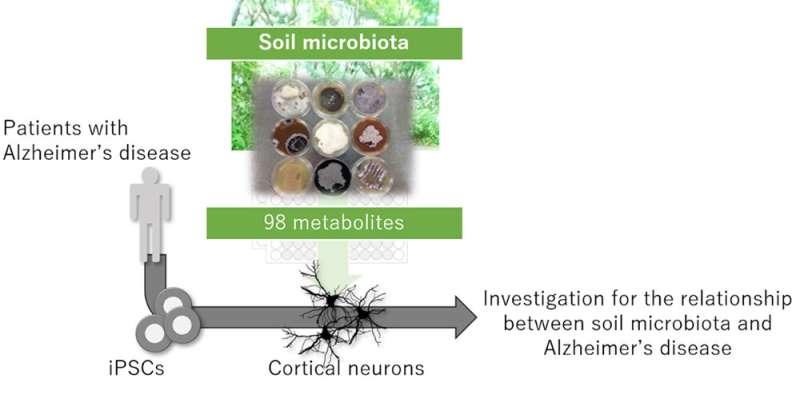Dirt can modulate the pathology in Alzheimer's disease

Eating well, exercising regularly, and having a satisfying social life are all crucial to staying healthy. Sometimes, however, it can be the tiniest things that make the biggest difference. In this case, those tiny things are microorganisms, such as bacteria and fungi. The metabolites they release can have profound effects on our bodies. In a new study using iPS cell reprogramming, an academic-industry collaboration led by CiRA Prof. Haruhisa Inoue shows how such metabolites may affect cortical neurons from Alzheimer's disease patients and healthy individuals.
The potential health benefits of the microbiota have long been established. Examples include the discovery of penicillin. Even the different mortality rates of COVID-19 across nations are reportedly attributed to different microorganisms in the body. The realization that microbiota can affect the brain came to light around the turn of the century.
"In recent years, research has suggested that amyloid β peptides, one of the pathogenic factors of Alzheimer's disease, can be a natural immune response to pathogens. On the other hand, there is also evidence that microbiota in the gut or oral cavity can regulate the Alzheimer's disease," explains neurologist Dr. Takayuki Kondo, one of the authors of the study.
Alzheimer's disease is the most common form of dementia, inflicting around 50 million people worldwide, a number that is expected to only grow with aging populations. Molecularly, the brains of Alzheimer's disease patients show plaques of amyloid β peptides. For decades, scientists have hypothesized that stopping these plaques is crucial for halting the disease. However, the underlying mechanisms in accumulation of amyloid β remain unclear, and different conditions of the body, such as the microbiota, may also be factors. Especially, only a small number of research to investigate the relationship between Alzheimer's disease and soil microbiota have been conducted due to the difficulty in cultivating soil microbiota or lack of database.
To determine the effects of microorganisms, Kondo and his colleagues used iPS cell technology to reprogram somatic cells from Alzheimer's disease patients into cortical neurons in combination with a library of 98 secondary metabolites that are produced by soil microbiota.
Amyloid in the brain comes in two forms. Amyloid β 42 is considered toxic, while amyloid β 40 is considered benign. High amounts of amyloid β 42 or a high amyloid β 42 to amyloid β 40 ratio is associated with a higher risk for Alzheimer's disease.
The researchers found that verrucarin A, a secondary metabolite produced by the fungus Myrothecium spp., reduced the amounts of both amyloid β 42 and 40 in the reprogrammed cortical neurons.
"With further modification of its chemical structure, verrucarin A may have potential therapeutic benefit at reducing amyloid β," said Kondo.
Another secondary metabolite, Mer-A2026A, produced by Streptomyces pactum, had different effects on the neurons depending on the dose.
"At moderate doses, Mer-A2026A reduced the amyloid β 42 and 40 levels, but at higher concentrations it increased the amyloid β 42 level. Therefore, it has a dual nature of risk and prevention in Alzheimer's disease," continued Kondo.
The report gives evidence of how studying metabolites produced from microorganisms using iPS cells may lead to new therapeutics for neurodegenerative disorders.
"Microorganisms in the oral cavity and intestinal tract are associated with various conditions of Alzheimer's disease. Understanding and controlling their effects can have therapeutic benefits," said Inoue.
More information: Takayuki Kondo et al, Metabolites of soil microorganisms modulate amyloid β production in Alzheimer's neurons, Scientific Reports (2022). DOI: 10.1038/s41598-022-06513-z




















